
Becky Goldburg – Supporting Actionable Research That Informs Conservation | GES Colloquium
How Pew's approaches increase the likelihood that research is applied in real world conservation decisions....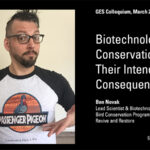
Ben Novak – Biotechnologies for Conservation and Their Intended Consequences | GES Colloquium
IN-PERSON COLLOQUIUM. Revive & Restore's "Intended Consequences" initiative aims at rebalancing the risk-benefit equation around the use of biotechnologies in conservation practices....3/29 GES Colloquium Cancelled
Statement regarding cancellation of the upcoming Colloquium on March 29, Panel: Narratives and Storytelling in the Public Communication of Science and Technology...
Faith Kearns – Getting to the Heart of Science Communication | GES Colloquium
A 21st century guide to communicating science on emotional and contentious topics...Continue reading "Faith Kearns – Getting to the Heart of Science Communication | GES Colloquium"
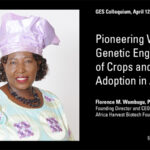
Florence Wambugu – Pioneering Work in Genetic Engineering of Crops and It’s Adoption in Africa | GES Colloquium
Factors influencing the adoption of GE crops in Africa, and Dr. Wambugu's pioneering work on GE sweetpotato and with the Africa Biofortified Sorghum (ABS) project. ...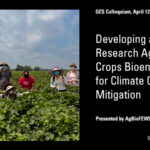
Developing a Research Agenda for BE CCS Crops – AgBioFEWS Cohort 2 Group Project | GES Colloquium
An interdisciplinary agenda to studying the impacts of bioengineered crops for climate change mitigation...
Welcome Back Lunch | GES Colloquium
The Genetic Engineering and Society Colloquium is a seminar series that brings in speakers to present and stimulate discussion on a variety of topics related to existing and proposed biotechnologies and their place within broader societal changes....
Jennifer Kuzma and Fred Gould – Ethical Dimensions of CRISPR Applications in Agriculture and the Environment | GES Colloquium
A discussion of the key ethical considerations in the governance of CRISPR technologies for agriculture and the environment, including for gene-edited plants and gene drive organisms....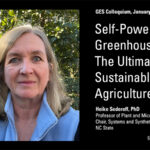
Heike Sederoff – Engineered Biology for Engineered Environments | GES Colloquium
Addressing the energy problem of greenhouse agriculture...Continue reading "Heike Sederoff – Engineered Biology for Engineered Environments | GES Colloquium"

Haydar Frangoul – CRISPR-Cas9 Gene Editing for Sickle Cell Disease and Transfusion Dependent β-Thalassemia | GES Colloquium
A presentation of data on using gene addition and gene editing technology to treat patients with sickle cell disease and transfusion dependent beta thalassemia....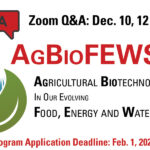
AgBioFEWS Zoom Q&A
Join Dr. Fred Gould, GES Center co-director, and Dr. Dawn Rodriguez-Ward, AgBioFEWS program coordinator, on Friday, December 10, 2021 at 12:00 PM. The Zoom session will start with a brief presentation of the AgBioFEWS program and leave time for all interested applicants to ask questions in the live chat box or via live video....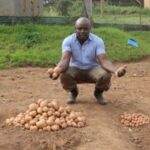
Blog: Considerations for developing GMO crops around the world
Agriculture is changing and so are the technologies needed to improve it. Scientists should be allowed to develop genetically modified (GM) crops to provide options for smallholder farmers who depend on a successful harvest for their livelihood. That position was highlighted in a panel discussion featuring biotechnology leaders at the Genetics Engineering and Society colloquium organized by the third cohort of the AgBioFEWs fellowship. The question that informed this colloquium was, who makes the decision on which GM crops are developed around the world?...Continue reading "Blog: Considerations for developing GMO crops around the world"
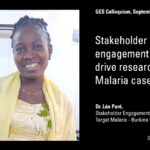
Léa Paré – Stakeholder engagement in gene drive research: A Target Malaria case study | GES Colloquium
Target Malaria's approach to stakeholder engagement is an iterative process, constantly adapting and evolving based on the context and values of our stakeholders, as well as new guidance and recommendations developed in accordance with international best practice....
David Berube – Hazard Communication | GES Colloquium
Hazard Communication refers to communication to a limited group of stakeholders and involves three variables: hazard data, dosage data, and exposure data....Continue reading "David Berube – Hazard Communication | GES Colloquium"
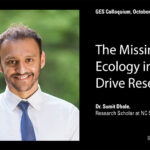
Sumit Dhole – The missing ecology in gene drive research | GES Colloquium
GES Fall Colloquium, details forthcoming...Continue reading "Sumit Dhole – The missing ecology in gene drive research | GES Colloquium"